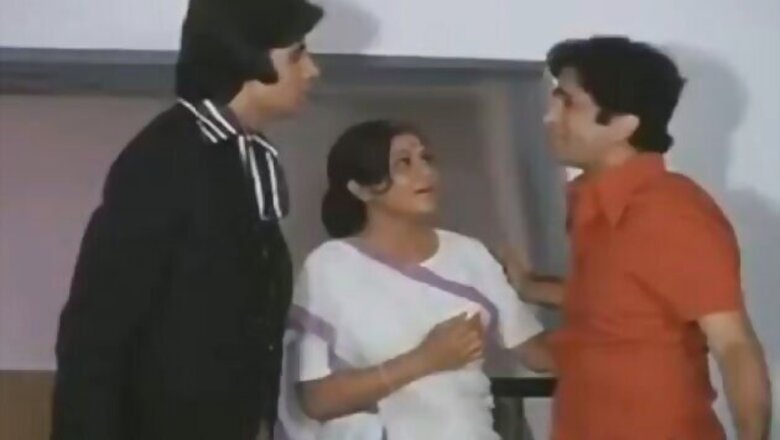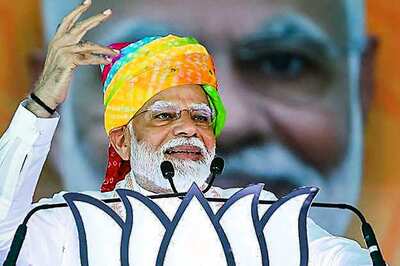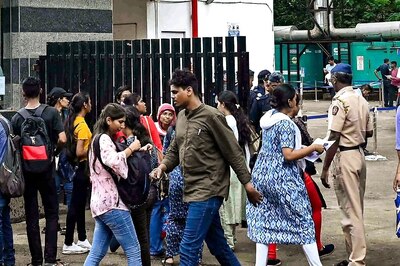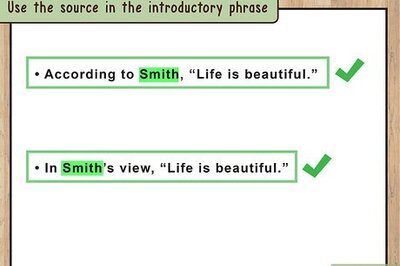
views
New Delhi: Right from the golden age of Bollywood(late forties to late eighties), the screen mothers were a critical and intrinsic component of most Bollywood movies. Family fare, Romance, Comedy, even in the violence-prone products of Salim-Javed (courtesy the Angry Young Man) the mother-son relationship took centre-stage. In fact, it was in one of their super-hit films, Deewar, that the defining line 'Mere Paas Maa Hai' featured, freezing the words and moment, forever.
However, contrary to popular belief, Nirupa Roy's hi-profile and solid, consistent innings with Ma-dom was preceded by perhaps the most famous mother in movie history - Mother India. The 1957 classic showcased the enormous, untapped range of the 27 year old Nargis (famous as Raj Kapoor's most popular, dazzling and successful heroine in such memorable films such as Barsaat, Awara, Shree 420 and Chori-Chori) who pulled out the stops to play (for the major part of the film) a de-glam mother of two sons, gutsy, spirited, fearless, constantly battling against overwhelming odds to emerge victorious even at the cost of personal loss. The role got her applause, accolades and awards in India and abroad, galore. Her role and the film, however, was a bold departure from the general pattern that coloured this persona, the coughing, virtuous, silent, suffering, caring, sacrificial creature, forever keeling over a dilapidated sewing machine, rustling up her laadla's favourite goodies or gently cajoling him to get home a nice bahu. Lalita Pawar, Sulochana, Achala Sachdev and Leela Chitnis were some of the actresses who epitomized this role to perfection. It would be fair to say that for around four decades, Hindi films were, largely, Ma-centric.
So whatever happened to the Moong-ki-daal, Aloo Paratha and Gajar-ki-Halwa rustled up in record time for 'mere laal' by these beta-fixated devis? Film Critic Rauf Ahmed believes that this creature came with an expiry date and her time was up. He explains. "Post liberalization, when we opened our markets and the world zoomed in, somewhere, tradition and innocence took a fatal hit and made a quick exit. A raw, blatant consumerist culture came centre-stage. Materialism was the new religion. Overnight, revered attributes like restraint, moderation and sacrifice were flung to the trash bin, replaced by the power of acquisition. Have Money, Will Buy. It was a nation and society in transition, in deadly fast-forward, and fittingly Ma-turned-Mom."
Film-makers agree. Even hi-profile directors like Mahesh Bhatt (Zakhm) Rakesh Roshan (Karan Arjun; Koi Mil Gaya) and the Yash Raj gang (Deewar, Trishul) seemed to have pulled the trigger on the ol' fashioned, Maa. The general reaction and response was that in these new-age times, this creature would appear corny, fake and hopelessly out of place. Besides, adds another Bolly tracker 'forget moms, even grandmoms of today are so hep n' cool and completely in sync with the world they live in. Sure these Daadis and Naanis love their grandkids, but they also (Vicky Donor) have a life of their own. C'mon yaar, if you are going to be a grandmom at age 50, you're hardly going to immediately drop everything - wardrobe, worldview, activity-base - and overnight turn spiritual to fit the role of the perfect budiya who is pota-fixated.'
Veteran Bollywatcher Promod Singhal adds his own bit to this debate. "Its simple. If you track some of the biggest hits of recent years, you will notice that not one have mothers in central roles, or of any significance. Thrillers, Romance, Drama, Comedies ... where does dear Mother India have a hope in hell to get a look-see, forget starring role."
Sad, but true. And not everyone is happy about screen-moms being handed the VRS (Voluntary Retirement Service). Screen Writer, Actor and Theatre person Amol Gupte (Taare Zameen Par)offered Tisca Chopra a solid flesh n' blood part which, even today, is remembered and talked about. Eminent writer, poet, lyricist, film-maker Gulzar gets it spot-on however with his perceptive take.
"Technology is a reality and because of that, modes of self-expression have changed. Hurried, stolen, looks and meetings have been replaced by mails and SMS. Similarly, with the march of time, the contours of the mother-son relationship too has changed. She is no longer somebody to be blindly worshiped and revered but loved and respected.
The challenge for today's film-makers is to attempt to strike the right balance, present the new-age Maa in a contemporary, credible and relatable way; infuse in the persona a modern, cool, strain, an informal flavour; make Mom a buddy and confidante without eliminating the core attributes that define the basic tenets of a mother-son relationship."
If Kiron Kher's hysterically hammy and ludicrous take in Dostana was any indication, or the ghisa-pitta Rekha-Hema turn in the recent bomb Sadiyan, then Gulzar-bhai's suggestions will be tough to crack. Thank god for sweet, charming, realistic portrayals like Supriya Pathak's in Wake up Sid and the fantastically path-breaking performance of Sri Devi in English Vinglish.
So will Maa return ? Have the mother-son vibes lost its popular draw? Is Gajar ki Halwa and Aloo Paratha out of fashion, replaced by Burgers, Pizza and Coke? Tell you what ... ask - Paa.



















Comments
0 comment